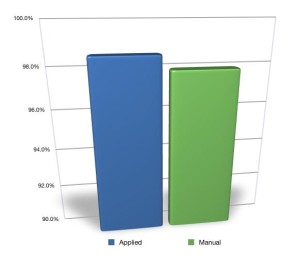 In the not so distant past, booking staff at a temporary staffing agency meant a lot of manual tasks: searching for the qualified ones, making contact via phone, email or SMS, checking their availability and interest, and then booking. A manual process. This is not the only way to do it anymore.
In the not so distant past, booking staff at a temporary staffing agency meant a lot of manual tasks: searching for the qualified ones, making contact via phone, email or SMS, checking their availability and interest, and then booking. A manual process. This is not the only way to do it anymore.
Today, the job can be published into an online job board with automatic notifications and the staffers can apply directly. They know when they are available and their application is the answer to whether they can or can’t do the job. The question arises: Is one way or the other better at providing good staffers for a job?
Short answer: no. Of the 25,000 shifts agencies booked using Watu, applications had a success rate of 98.6 percent while manual booking had a success rate of 97.9 percent. Those numbers are probably too close to claim any statistical difference, but if we still want to compare it, letting staffers apply instead of manually booking them is better.
Success rate in this context means people showing up to work on time, with the appropriate uniform, behaving properly, not being fined that day, etc. If there’s no groundbreaking difference between the success of two methods, why am I even writing this piece? Because there’s a big difference between applying and manual button, but it’s not their success rate.
PREMIUM CONTENT: 2013 Online Staffing Platform Landscape report
The big difference is that booking staff manually takes time, valuable managers’ time. The administrative cost of keeping track of whom you’ve contacted, what they said, who to contact next etc. is onerous.
The manual process of booking people can also be error prone. Different managers will have different skills and styles which might impact the consistency of your agency. A manager having a bad day won’t impact whether people apply for a job or not, but it might impact who gets manually booked and who doesn’t.
The bottom line is, letting staffers apply is more efficient, which means it’s more profitable for you.
When we show our customers how they can build a job board and let staffers apply directly, a very common reaction is: “Oh no, we don’t want to do that, we like talking to our staffers, keeping in contact, being human.” We are on board with that idea, we just think that interrupting their day to see if they are free next Monday is not a good way to do it. There are better ways.
Now that your managers are saving time, and the increased productivity means it’s less costly to book and manage a job, you can redirect that saved resource to making a different impact on your staff, one that they will remember and which will create good will and loyalty.
Another interesting pattern that we observed is that many agencies have those staffers they consider rock stars. These are workers that are awesome and they don’t want them to leave. If managers have more free time from having to call everybody, they can spend more time calling these special ones, courting them, making sure they are happy and not wanting to leave.
In case you are wondering what happens with those unsuccessful shifts, here’s a breakdown (click to enlarge):
We prefer to refrain from extracting any conclusions from these numbers because there are no statistical differences in them.
But it’s clear that publishing jobs delivers a more effective booking method and saves you time, creating space to work on value add tasks and building your business.











[…] Read the rest of the article at The Staffing Stream […]
[…] Read the rest of the article at The Staffing Stream […]